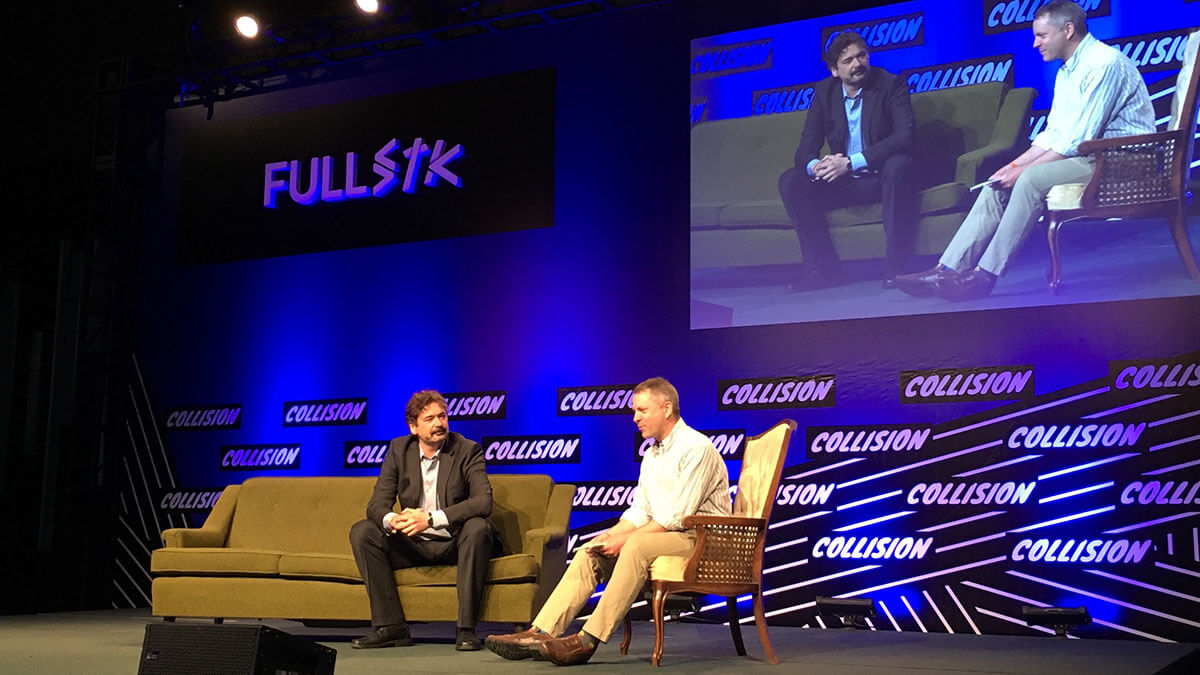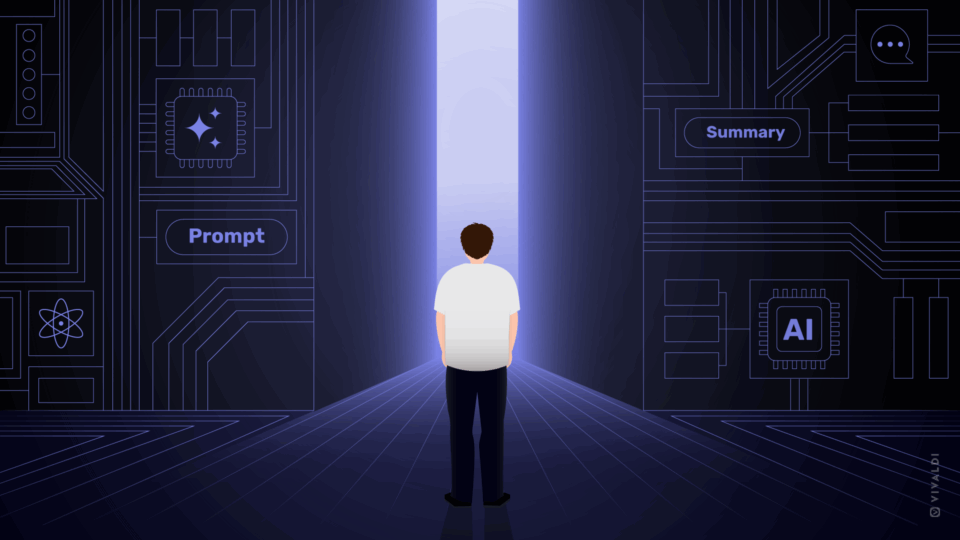
We’ve been having a blast at the Collision Conference in New Orleans this week. Yesterday, our CEO Jon con Tetzchner sat down for a fireside chat with Rob Pegoraro (Yahoo Finance / USA Today) to discuss the forecast for the browser market, what sets Vivaldi apart and his concerns over the often malicious use of the web today. Watch the video from the FullSTK Forum stage or keep scrolling to read the transcription of the talk below.
You can follow the action at Collision by visiting them on Facebook or Twitter (#CollisionConf).
Video transcription
Rob Pegoraro: Good morning. So this is a fascinating topic for me personally because I recall writing 18 years or so ago that it was really kind of bad that we were looking at a Microsoft monopoly. And it wasn’t just a monopoly of Microsoft, but of Internet Explorer 6. So that forecast of mine was not correct. People did notice; they went with a better browser.
And these days it seems like we’ve got a pretty healthy market. We’ve got Google and Microsoft – Edge is much better than IE ever was. Safari leaks memory like crazy, but it’s got some nice features. And Chrome has taken off ridiculously well. What are those big three players – and Mozilla, with Firefox – what are they all missing that you’re going to do better?
Jon von Tetzchner: I think one of the things that’s been happening with the browser market – like with a lot of other things – is that, you’re going for simplification, right? So you have browsers that look and feel the same. They’re all trying to address the same market. They define the end user that they want to go for and they take away anything that’s different or special. So you end up with something that’s quite limited in its approach.
Our feel is there is a need for something else. A browser that considers that we are all different. We all have different requirements. I mean, we don’t all wear the same clothes. We don’t all drive the same cars. We have actually quite strong opinions on these kind of things. And I think a tool that you spend quite a lot of time with each and every day – actually being able to use it in a more advanced way; being able to do more – is something that matters.
And that’s what we do. Instead of saying “OK, let’s simplify. Let’s remove all of the functionality,” we say “OK, let’s put in a lot of functionality, but we still make it work easy.” And that’s a lot harder. It’s a lot easier to say “OK, let’s just remove everything and make everyone go through a singular tract and everyone does the same thing.”
In our case – no, no, no. There’s a multitude of different ways to do the same thing and we adopt to you and your requirements; how you want to work with the browser.
RP: So Vivaldi is a free browser. You’re trying to optimise it for privacy as well. You do not charge for it. What’s the business model?
JvT: The business model is actually the same as in general for other browsers. You make revenue from deals you do with the search engines, for example. You pick and choose search engines that you put in there. We just added Ecosia, as an example. So we have deals with these companies and that generates some revenue for us.
Also, some of the bookmarks that we include generate revenues. It’s a fairly known way and it’s a great way because we not only focus on providing the best possible product for the end user. We then try to choose the partners that our users would like, but still give them the flexibility to do whatever they like.
The revenue – at Opera we were talking about a revenue of $1 per user per year. So it’s not a lot of money, but as long as you get enough users…
RP: You make it up on volume.
JvT: Yes.
RP: Another interesting thing that’s changed a lot in the browser market since the battle days of 2001 or so, is how much of this is all open source code. Your browser uses the Blink rendering engine of Chrome. A lot of the UI itself, I understand, is built out of open source web code. How much of that has eased your job and that of anybody trying to break into the browser market?
JvT: I think having built one of the few codes that was available, the Opera code, I know how much work it is. And there’s a reason why none of the companies… I mean there’s been no new browsers coming from scratch for almost 20 years. Just try to think about that. That means that Safari was built on the KHTML code…
RP: Yes!
JvT: …and Chrome was built on the Safari code. We follow in that same way and we are building then off the Chromium code base. So, given that it wasn’t possible for Apple or Google to start from scratch, you can safely assume – even though we’ve done this before – that we also recognise that it would take us a lot of time to do so. So, realistically, starting from scratch would be impossible.
Instead, what we do, we focus on the user interface part of it. We’ve actually done things in quite an interesting and different way. The whole user interface is actually a web page. So, the browser is written using the browser. Which means we can develop very quickly, we can debug very easily, there’s no huge compiles necessary (most of the time) and it allows us to take input from end users and actually do something about it inside, sometimes, as little as minutes. Which is a fantastic feeling.
RP: The feature that really caught my eye was all the analytics you give the user about their own history. Which I guess advertisers were always seeing, but in this case you as a user can see how much time you waste at Apple Rumours sites, or whatever it may be.
JvT: Clearly, there is a lot of information about all of us. At the same time, we don’t have access to that information. So, what we did… OK, we have all this browsing data on your computer. Why not use that for your use? We’re not putting this out there. This is for your eyes only and we’re actually just presenting the data that is there, but it gives you a lot of information.
It helps you find… OK, “I was browsing on these and that day and I found this interesting article.” And you can use the context of what you were looking for and it can help you find your way in History.
We take every part of the browser and say we say, “What can we do to make this a lot more useful?”
The second thing, as you mentioned, is the statistics that you can see – “This is how much I’m browsing.” And if you want to see how much time you spend on Facebook or Twitter or the like…
RP: No, we don’t (laughs). We don’t want to know that.
JvT: Well, you can. You don’t have to, but it’s all there. It might be useful to some people to see at what of the day that you’re using it. Is there is lot of it at 3 a.m., that might be something?
RP: Yeah, I wouldn’t know anything about that (laughs). So, where do your users break down in terms of Mac, Windows, Linux?
JvT: Overall, in relation to the platform sizes, the odd one out is Linux. Our Linux user group is massively bigger than Linux in general. We have a lot of support on Linux which is fantastic. A lot of us are Linux fans at the company, so it’s a lot of fun to be working with the Linux community.
RP: OK, good. Site compatibility can be a big deal with browsers. Extensions as well. It’s interesting to see that you added support for Chrome Extensions not long ago. Was that something where it wasn’t originally part of the plan and then your users said, “Look, I can’t live without my Evernote Web Clipper” or whatever their favourite extension is?
JvT: No, actually it was part of the plan from the very beginning. Obviously, we have the benefit of running on the Chromium code base, so being able to be compatible with the plugins available and the extensions available is maybe not as difficult. Except it is. Because we decided to the web UI, we had to do all the hooks and all the work. And all the things to get it working. So the guys have done a tremendous job to make that. One of the hardest things for us to actually get working was the extensions – because of our decision to do the browser web-based.
Now the benefit of doing the browser web-based is, clearly, a lot faster development and also that we have cross-platform development. We have Windows, Mac and Linux being available at the same time. They look and feel the same although we do address the differences between the platforms and adapt to the platform requirements and look and feel. But we do it on the web side… We save a lot of time in doing this and it allows us to work in a very dynamic way. We choose, for any task that we need to do, the best tool. Do we do it with C++, do we do it with JavaScript, HTML and the like?
RP: But how much time do you spend making sure that site X, Y or Z looks and works right in the browser? I mean, theoretically, that should be solved for you using the Chromium code base, but what are the things that complicate it?
JvT: Given that we’re using the Chromium code base, basically all sites work out of the box. The issue for us is browser sniffing. So if some site recognises that it’s Vivaldi – they explicitly look for the word “Vivaldi” in the text – and they do something silly, then…
RP: Now that’s gotta be fun…
JvT: Yeah and interestingly it’s companies like Google that do that.
RP: How rude.
JvT: We have a list of sites where we “hide” ourselves. That’s the thing that we have to spend time on. Almost all of the cases we don’t really have to do anything. Again, it’s Chromium. It’s the most used code base out there so we don’t have to do anything. The sites just work. But if there are bugs in our code, then obviously we fix them fairly quickly.
RP: So we talked about the desktop. Do you not have a mobile browser? How is that?
JvT: It’s just been taking time. We started on Android at the same as we started with desktop and then we found that our solution for doing the desktop browser – including solutions for the extensions and the like – did not really lend itself well to the mobile browser.
So, from that perspective, it actually delayed our progress a little bit. But the mobile browser is in the works and it will be coming out there. It just takes a little bit of time.
RP: Will that be for Android and iOS, or just Android?
JvT: Initially Android. The issue with iOS is that we cannot use the same code base.
RP: Right, you have to use WebKit…
JvT: Yes, and that means there is a lot more extra work for us. Obviously, we’re hoping that Apple does the right thing and stops not allowing other browser cores to run on their platform.
RP: Well, good luck with that (laughs).
JvT: Well, sometimes things happen. It’s the right thing to do, and sometimes companies learn from their mistakes and they change, so I’m hoping that they’ll do that. But if they don’t, then they’re making our task of providing a browser on the platform a lot more difficult.
RP: Yeah and I guess you would probably still want to have the user designate a non-Apple default browser on iOS, which is also something you can’t do right now?
JvT: Yes. Which is something that doesn’t make any sense whatsoever. I have always had this view that when you have guests, you don’t lock the door. You don’t throw away the key. Instead you entice them. If you want them to stay, you give them something good to eat, something good to drink. Put on some good music or do something that they will be happy with when visiting you. Don’t lock them in. That’s just the wrong way.
RP: That’s, I guess, one threat to a vibrant browser market. What other worries keep you up at night?
JvT: Ummm…
RP: …in the browser market sense. Not like President Trump or anything else (laughs).
JvT: Actually, I am thinking about a lot about how does our world play into all of this, right? How does the world of browsers and the internet play into the discussions on politics? How was the internet used to distribute false news and the like? That’s quite interesting and I believe that there’s something we could do there.
I think of significantly more focus on privacy. Instead of opening up so that more companies can get into our data and make profiles on us, make this harder by not allowing to collect the same amount of data and actually say how you’re able to use it.
I think if you did that, that would be a very important factor in making it harder to target us in the kind of ways that we’re seeing now. This is a question of privacy and I think that these are things that go hand-in-hand. Maybe we’ll see less intrusive ads and, at the same time, we’ll see less targeted fake news.
RP: That would be nice. Let me ask you the dreaded two-part question. One is: what is your forecast for the browser market two years from now?
JvT: In some ways, I believe things will continue to evolve. Obviously, we are going to be at the head front on coming up with new technologies and new innovations. I don’t want to tell you everything about it because, partly, I don’t know. We work as a team. Anyone can have an idea and something will happen.
But on the other hand, if you’re thinking about the overall direction, I think the internet of things and connecting things is something. At Opera, we worked on from 2005 with the “Alien” project (as it was originally was called internally). It was a concept of having two-way communications. So I think that’s something we haven’t come very far with and I think the internet of things is a mess because you have a lot of incompatible solutions. I think things are going to be happening there.
It’s been moving extremely slowly because of the closed systems, but I think over time people will see the light and we’ll see an open system and we’ll see a lot of innovation coming through that. So, getting the different devices connected and connected in a way where they’re actually working together instead of having to have one app per device which kind of makes everything very, very, very difficult.
It’s related to browsers from the perspective that, I believe, all of those things need to be based on web technologies. Trying to actually agree on any other standard… we’ve seen that. That doesn’t work. You invent your standard and you try to get other people to support it and they say “why should we support your standard? You should support mine.” The only way you can avoid that is if you say, “Let’s just use this common standard, where the basics are all in place, and then we just work on moving that forward.”
RP: Yeah and so far the most common standard is an Amazon Echo ordering around the rest of your devices.
JvT: And the thing with that is that you do the Amazon Echo. And Google has their thing; and Apple has their thing; and then Samsung has their thing – and you have a number of others. And they don’t work together.
What you’d like to see is that any third-party developer should be able to connect all these devices together so when you come home you can have things happen automatically. Your car is talking to your stove, or anything that you’d like it to program. At home I have a lighting system that’s controlled, I have a jacuzzi that’s controlled and I have various other devices. If I wanted, for example, on my way home to turn on the lights and the jacuzzi, I couldn’t do that.
RP: So that’s a multiple-app step.
JvT: Yes. There are ways to do that, but I really think it should be standardised. We should define APIs for all of this and this is where there’s only one natural place for this – which is the W3C.
RP: And, the second part of that question: two years ago you must have had some well defined senses of what the browser market was going to look like in 2017. How has reality diverged from your forecast?
JvT: My feeling is that when you’re inside the bubble you feel that everything is working in a glacial pace. Everything is so slow. So we’re just doing our thing and we feel, obviously, that what we’re doing is moving very quickly, but we would like to see that there are more things happening.
There are some interesting technologies coming out, but overall I’d like to see things move a lot faster. A lot more technology happening. And at the same time, keeping in mind that we need to think about the ethics and the morals of our place in society and how we ensure keeping our users safe overall.
RP: From malware and?..
JvT: From malware and also from… Again, we’ve been seeing how the internet is being played, and I get a little bit pissed off about that – how the internet is being used to reach people in malicious ways. And obviously, thinking about ways to stop that. In some way, I think that some of those things are fairly obvious – the privacy thing I think is extremely important – and I think we should talk about these things as well. But it’s more difficult to do it purely in software, in the browser. It’s better if you do it on a more global scale.
RP: I think someone once told me the only problem with the internet is the human beings on it.
JvT: With any tool, you can use it for good or for bad. The nice thing with the internet is it’s the big equaliser, and we’ve seen how voices can be heard through the masses. Voices that should be heard. And that’s a fantastic thing.
The same tools, however, are being used to undermine society. And that’s a sad thing – that you’re seeing something as powerful being used to undermine free speech. It’s kind of a weird situation that we’re having.
But when it comes to the internet – this is something that we’ve been working on for all these years – and seeing it’s misuse it’s obviously something that we need to take seriously. We have to fight for keeping the internet open and free. That all the information out there continues to be available to all people, that we don’t get silos, that we don’t have different speeds; all those things that we’re having a discussion on. We worked so hard to get the internet to where it is today and we have to continue working on it. Continuing to get it evolved and provide new technologies in new ways that move humanity forward.
RP: That’s a good place to end it. Thank you, sir.
JvT: Cheers.
Follow the action at Collision by visiting them on Facebook or Twitter (#CollisionConf). If you’d like to say hello to Jon or Tatsuki while at Collision, get in touch!


